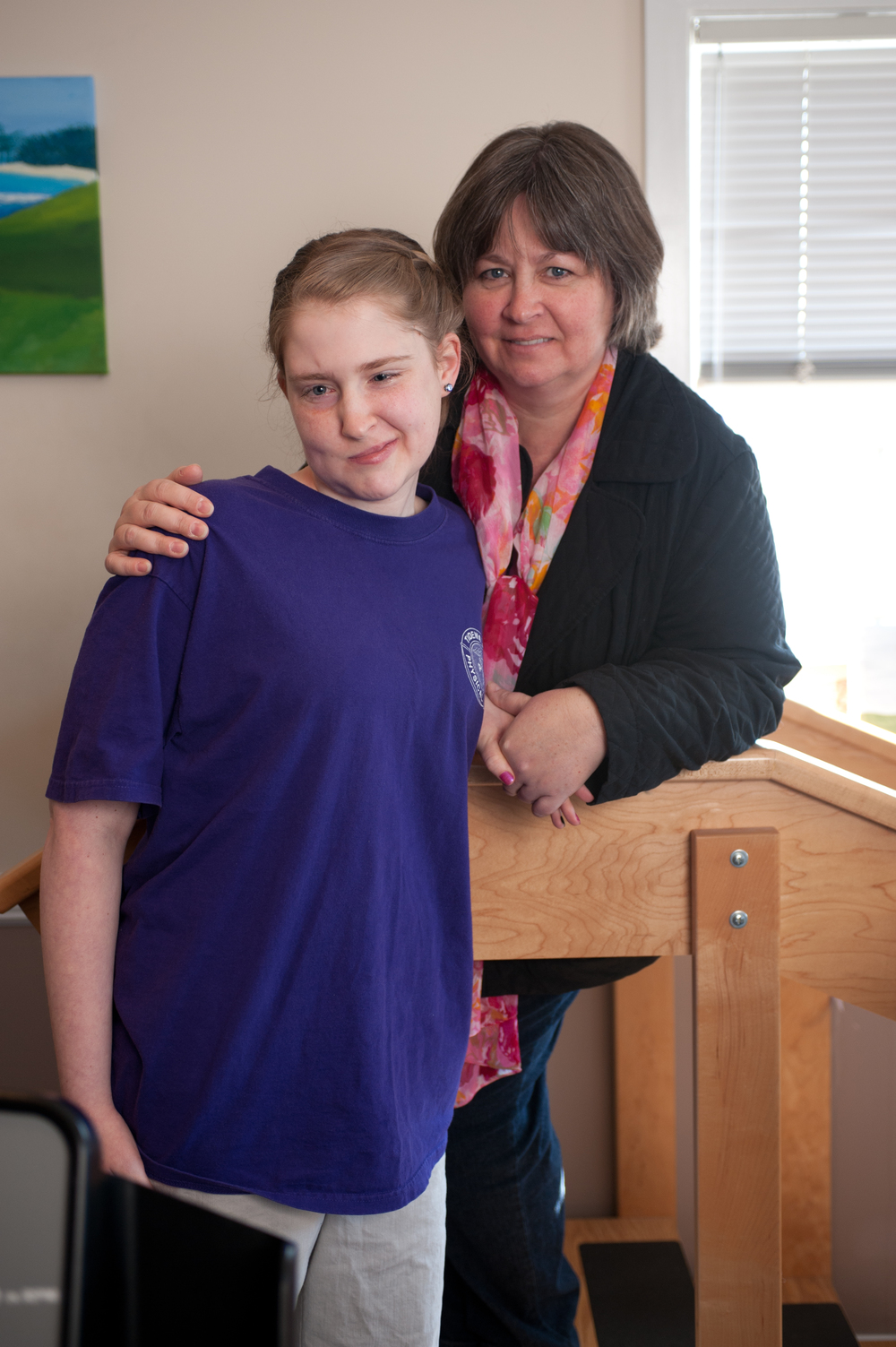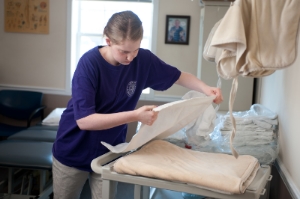It’s been four and a half years since Karissa Yoder’s life-altering car accident.

Karissa Yoder and her mother Carla at Tidewater Physical Therapy Harrington.
In September 2011, during her freshman year at Rosedale Bible College in Ohio – just six weeks into her college career – Karissa (pronounced like “Theresa”) and two friends were driving back to campus after leaving morning church service. Her friend (and driver) made a split second decision to pull out in front of a van while trying to enter the roadway. The van slammed into the left driver’s side of the car with Karissa sitting in the front passenger seat. While it is uncertain, Karissa’s parents were told the car was hit with such force that Karissa actually hit her head on the gear-shift in the left temple area causing multiple skull fractures.
As the accident occurred near her church, members leaving the church drove passed the scene and recognized the car. Through connections at the college, Karissa’s parents, Kevin and Carla Yoder living back in Delaware, were notified about the accident and were told to make it to Ohio as soon as possible.
During this time, Karissa was airlifted by helicopter to the Ohio State University (OSU) Hospital where it was immediately determined that she needed an emergency craniotomy to repair the break in her skull.
Meanwhile, her parent’s embarked on the 10-hour drive to Ohio.
A local preacher, several leaders from Rosedale Bible College, as well as other friends of the Yoder’s from the area, greeted them when they arrived.
During the surgery, the neurosurgeon made the decision that he would put Karissa in a medically induced coma for two weeks while also being on a ventilator so her body and brain had some time to heal undisturbed.
After she didn’t wake from her medically induced coma but could breathe on her own, she remained in the ICU for a total of three weeks and was moved to a “step-down unit” when she became “medically stable”. She was in a coma for a total of three months.
Even though Karissa was in a coma, the hospital required her to be moved to a long term care facility with a rehabilitation program that was of the parent’s choosing. Karissa’s parents weren’t supportive of this decision but based on their insurance benefits, the move was necessary.
Within three days of being at the rehabilitation facility in Ohio she developed a high fever, (it was determined later that she had the beginning stages of pancreatitis), and she was transferred back to OSU Hospital. At this point, Karissa’s parents were told that it was unlikely that she would wake up and would remain in a vegetative state. Her family, being people of faith, held on to hope that she would come out of the coma.
The OSU Hospital doctors were able to help Karissa’s body heal from pancreatitis, and she continued on medicines to stimulate her out of a coma. For four weeks her parent’s researched and advocated for their daughter to be placed in a rehabilitation facility closer to the East Coast, which would be closer home. They chose, and were finally invited, to Bryn Mawr Rehab Hospital – a leading rehab facility near Philadelphia – that were willing to accept Karissa on a conditional “trial” basis for 30 days.
Karissa’s parent’s worked with Bryn Mawr to arrange for her transport from Ohio to Pennsylvania. An air ambulance service was contracted to fly Karissa and her parent’s to Philadelphia and then transport them by ambulance to the Bryn Mawr Rehabilitation Hospital in Paoli, Pennsylvania, an additional 45 minutes from the airport.
Upon Karissa’s arrival at Bryn Mawr, they gave her a shower and put her in fresh clothes. It was the first time in months that she wasn’t wearing a hospital gown. Within the first week, Karissa began to awaken and did a “thumbs-up!” In addition, towards the end of the first week, the physical therapist decided that, during the transfer from bed to wheelchair, she would see what Karissa would do when “on her feet” – to everyone’s amazement, Karissa used her own muscles to bear her weight!

After only three weeks at Bryn Mawr, Karissa and Carla Yoder were playing UNO! Another big moment for the pair was one day when Carla gave Karissa lip balm, Karissa remembered what it was and put it on her lips.
In March 2012 – six months after her accident – Karissa began to talk again.
Because of Karissa’s significant improvements, she stayed at Bryn Mawr for a total of five months. When she was released, although she still had a feeding tube, she could take steps with her arms around someone.
Back in Delaware, Kevin and Carla Yoder made the changes necessary in their home to accommodate Karissa’s new lifestyle needs. The office became Karissa’s bedroom and Carla slept on a mattress on the floor to be with her daughter throughout each night. During her first few months home, she worked continuously with local occupational and physical therapists.
In early October 2012, Karissa became seriously ill. When she complained of a horrible headache, Carla Yoder took her daughter to the doctor; however, the doctor could not find any specific issue. When they returned home, Karissa went in for a nap. A few hours later Carla went to wake up Karissa but Karissa wouldn’t wake up. Kevin immediately called 911 and Karissa was rushed to Milford Memorial Hospital where it was determined she had bacterial meningitis. She was in a coma for five days.
During these five days, the medical team discovered Karissa had a pocket of fluid in her brain, most likely a result of the bacterial meningitis. She was transferred to Cristiana Hospital where she had surgery to drain the fluid off her brain and remained at Cristiana for seven weeks. She arrived home just in time for Thanksgiving in 2012.
Separately, Kevin Yoder, Karissa’s father, had been hearing of a well-respected, and often used physical therapist in Harrington, DE. Several patients of the Harrington clinic of Tidewater Physical Therapy was sharing Karissa’s story to Pat McKenzie, clinical director and senior physical therapist. Kevin decided he would advocate for Karissa’s rehab with Pat and his staff. Kevin stopped at the clinic and introduced himself and the situation with Karissa. Pat was hesitant because he felt Karissa might need more individual, and intense, therapy, as well as occupational therapy, and did not want to “short change” Karissa.
Karissa’s grandmother also had the need to see a physical therapist and went to see Pat McKenzie because of Kevin Yoder’s high remarks. While at PT, she spoke about Karissa and Pat finally said, “I need to meet this young lady.”
In spring of 2013, Karissa became an official patient of Tidewater Physical Therapy while also going to another location for occupational therapy. Karissa thrived in her new Tidewater Physical Therapy surroundings! Carla Yoder also felt very confident leaving her daughter alone at the clinic with the Tidewater Physical Therapy staff during Karissa’s appointments.
Throughout 2013, Karissa continued with her physical therapy three times a week at the Harrington clinic where she would ride the bike for three laps, use the hand bike, complete her leg exercises, work on her balance and coordination and walk on the treadmill. Karissa’s experiences at Tidewater Physical Therapy were enhanced with her ability to also have a social outlet while at her sessions and learn more about physical therapy as an occupation. She loved all things about Tidewater Physical Therapy.
One day Karissa told Pat that she wanted to work in a place like Tidewater Physical Therapy when she got older. Pat knew she would be a perfect match to help out at his clinic. Soon thereafter he approached Carla Yoder and said, “I want to make this happen for Karissa.”
During the summer of 2014, in addition to continuing her physical therapy at the Harrington clinic, Karissa started to work there one day a week. Her main responsibilities were to: clean treatment tables, change pillowcases, and prepare fresh hot packets for patients.
Today, Karissa continues to work at Tidewater Physical Therapy. In addition to being a patient, she loves her job! Every week she works hard to improve her coordination, strengthen her muscles, and make a positive impact on other patients at the Harrington clinic.

